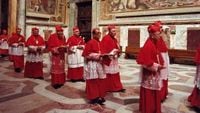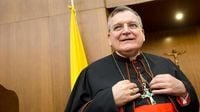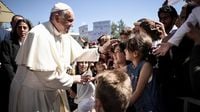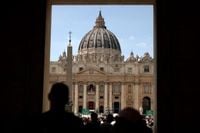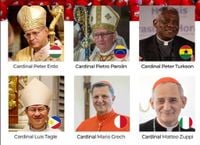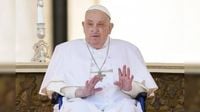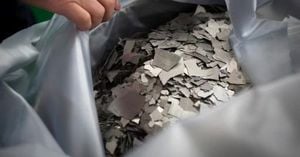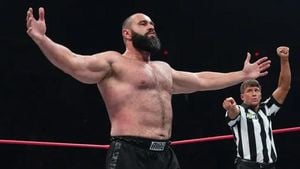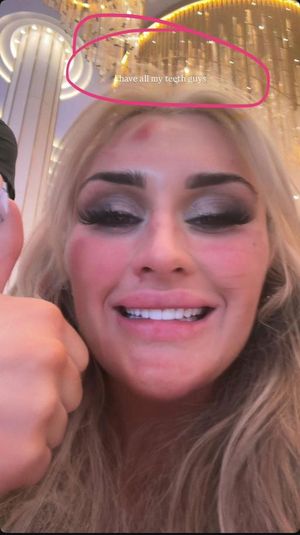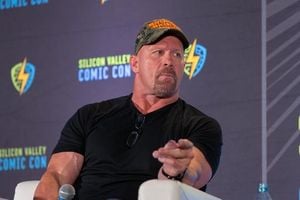Pope Francis, the head of the Catholic Church, passed away on Monday, April 21, 2025, at the age of 88, following complications from double pneumonia. His death, which occurred at 7:35 AM (0535 GMT), marks the beginning of a significant transition for the Catholic Church, entering a period known as sede vacante, or "the seat being vacant." This period initiates the centuries-old process of selecting a new pope, a tradition steeped in ritual and history.
The Vatican confirmed the news of Francis' death, with Cardinal Kevin Farrell expressing deep sorrow, stating, "His entire life was dedicated to the service of the Lord and of His Church. He taught us to live the values of the Gospel with fidelity, courage, and universal love, especially in favor of the poorest and most marginalized." Francis had been hospitalized for weeks battling a complex lung infection that led to early stages of kidney insufficiency, following a bout with bronchitis earlier in February 2025.
As the world mourns the loss of the 266th pope, attention now shifts to the potential candidates who may succeed him. The selection of a new pope will occur through a conclave, a secretive gathering of eligible cardinals inside the Sistine Chapel at the Vatican. This process typically takes between two to three weeks, although it can extend longer if the cardinals struggle to reach a consensus.
Among the cardinals being considered as potential successors, several prominent names have emerged:
- Cardinal Luis Antonio Tagle (Philippines) - A frontrunner for the papacy, Tagle is known for his progressive views, closely aligned with those of Pope Francis. He currently serves as the President of the Catholic Biblical Federation and Grand Chancellor of the Pontifical Urbaniana University.
- Cardinal Pietro Parolin (Italy) - Serving as the Vatican’s Secretary of State since 2013, Parolin holds significant diplomatic experience, which could be crucial in today’s geopolitical climate.
- Cardinal Péter Erdő (Hungary) - As the Archbishop of Esztergom-Budapest and Primate of Hungary, Erdő is considered more conservative than Francis, yet has shown a willingness to collaborate with him.
- Cardinal Raymond Leo Burke (USA) - A prominent conservative figure, Burke has been a vocal critic of Pope Francis. His candidacy raises questions about the potential for an American pope, a first in the Church's history.
- Cardinal Matteo Zuppi (Italy) - The Archbishop of Bologna since 2015, Zuppi is another name in the mix, known for his pastoral approach.
- Cardinal Willem Jacobus Eijk (Netherlands) - Eijk, a former medical doctor, has been Archbishop of Utrecht since 2007 and became a cardinal in 2012.
- Cardinal Mario Grech (Malta) - Serving as the Secretary General of the Synod of Bishops, Grech plays a pivotal role in the global synodal process.
- Cardinal Peter Turkson (Ghana) - If elected, Turkson would make history as the first pope from Africa in modern times.
- Cardinal Angelo Scola (Italy) - A seasoned theologian and philosopher, Scola has held significant positions within the Church, including Archbishop of Milan.
- Cardinal Pierbattista Pizzaballa (Italy) - Serving as Latin Patriarch of Jerusalem, Pizzaballa has extensive experience in a region fraught with conflict.
As the candidates are being discussed, the implications of Francis’ legacy loom large. He was known for his efforts to make the Catholic Church more inclusive, addressing issues such as immigration and LGBTQ rights. The next pope will inherit these challenges and the expectations of a diverse global Catholic community.
In a notable moment just a day before his passing, U.S. Vice President JD Vance visited Pope Francis at the Vatican, marking the pontiff's last official meeting. This meeting has sparked discussions about the possibility of an American pope, particularly with Cardinal Burke and Cardinal Joseph Tobin, who is also considered a contender.
Historically, no pope has ever been elected from the United States, despite its significant Catholic population. The process of selecting a new pope is governed by the College of Cardinals, which consists of cardinals under the age of 80 who are eligible to vote. Currently, there are 138 electors among the 252 cardinals, with 17 residing in the U.S., of which 11 are electors.
The conclave will commence once the necessary preparations are finalized, including the role of Cardinal Giovanni Battista Re, who was recently extended as dean of the College of Cardinals. The voting process involves several rounds until a candidate receives a two-thirds majority, with the outcome signaled by white smoke from the chimney of the Sistine Chapel.
As the Catholic Church stands at this pivotal crossroads, the world watches closely. The next pope will not only guide the spiritual direction of 1.3 billion Catholics but also influence how the Church navigates contemporary issues in a rapidly changing world.
